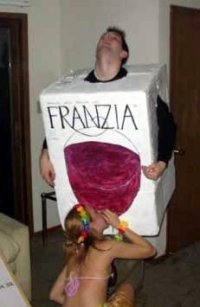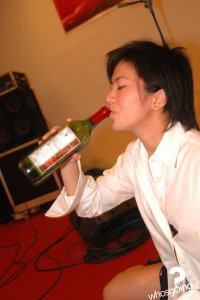Bartholomew Broadbent hopes Americans will be so fired up over Chinese culture they'll clamor for his wines.
Marketed under the Dragon's Hollow label, the wines are coming from China, the world's fifth-largest wine- producing country, though few of the nation's wines are exported. Broadbent understands why.
"Much of it is very poor quality – thin, green, insipid, lacking elegance and any sort of depth," says Broadbent, owner of the San Francisco wine-importing company Broadbent Selections Inc., speaking by phone from London.
But the potential for the Chinese to make wine more palatable to Westerners is there, Broadbent is convinced.
As a consequence, he joined longtime China wine distributor David Henderson three years ago to create Dragon's Hollow, which draws grapes from a 9-year-old, 1,600-acre vineyard in the auto- nomous north-central region of Ningxia Hui.
The officially recognized Chinese appellation for the area is He Lan Mountain, a desert plateau "very, very hot" during the summer but so cold during the winter that vines have to be bent over and buried with 10 inches of sand to keep them from freezing, Broadbent says.
Broadbent and Henderson conceived the brand to appeal largely to Chinese restaurateurs in the United States, but they've been surprised by early corporate buyers, including American Airlines, which bought 2,000 cases.
Making wine in China has had its frustrations, says Broadbent. They include persuading growers to wait until grapes are mature before harvesting and to cultivate more for quality than quantity.
"The biggest challenge is getting people who don't have the first clue about Western food to make wine to go with Western food," Broadbent says.
Yinchuan, the capital of Ningxia Hui, has 1.8 million residents, but not a single McDonald's, he found. "It's so remote they've never tasted Western food, and they hadn't tasted Western wine until last year," he says.
The population of Ningxia Hui is one-third Muslim, and many of Dragon Hollow's workers are Muslim, but Islamic strictures against the consumption of alcohol are taken lightly in the area, Broadbent has found.
"I've been at banquets with some vineyard workers who are Muslim and seen them drinking. They don't have hang-ups about alcohol."
With many Americans questioning the propriety and safety of various "Made in China" products, Broadbent concedes his timing to introduce Chinese wines to the United States could have been better.
But he's convinced the wines are wholesome, noting that the vineyards are free of chemical additives and that the wines are subjected to minimal manipulation in the cellar.
"We can improve quality, but for purity, they're great," Broadbent says of the wines.
And he does have the Olympics to help spur potential consumer interest in the wines. He makes it clear, however, that Dragon's Hollow isn't a short-term novelty meant to capitalize on these Summer Games.
"It's not an Olympic gimmick. For us, it's a very serious brand we plan to grow quite strongly."
Medal count
So where do Dragon's Hollow wines – all dry, all with 12.5 percent alcohol, each $13 – stand on the podium?
• Bronze: The 2006 unoaked chardonnay has a betwixting biscuity smell and a hint of pear in flavor, but it's soft, more fitting as aperitif than with food.
• Silver: The 2006 riesling is an understated but clean introduction, with refreshing peach and apple attributes, and gripping structure.
• Gold: The 2005 cabernet sauvignon is fresh, young and simple, speaking trippingly of the herbal and minty side of the varietal.
Taylors Market carries Dragon's Hollow riesling and chardonnay. Nugget Markets may soon stock some of the wines.
skip to main |
skip to sidebar




Enhance the pleasure that you get from wine by sharing your experiences, knowledge, news articles and facts about the elixir of the gods and bacchanalia on earth by emailing: bacchusforyou@bellsouth.net

ORIGINAL BACCHANALIAN CREATION

BACCHANALIAN WINE GLASS

I LOVE WINE, BUT I NEED TO LEARN HOW TO DRINK IT

Related Links
Blog Archive
-
▼
2008
(305)
-
▼
August
(19)
-
▼
Aug 24
(14)
- Trimbach to produce a Grand Cru
- Winery wins fight to stop trees
- Wine Spectator Gives ‘Award of Excellence’ to Fake...
- The Wine Industry's Best Green Shipper Available I...
- ReCORK America gains recycling partner
- Bargain Barrels for '08 Vintage?
- Tasting Notes
- Cool climate wines
- Australia becomes New Zealand's biggest market
- The Sipping News
- Carmen Wines Go Green with Lighter Wine Bottles
- Olympics may help Dragon's Hollow, but importer sa...
- Reconsidering sulfites
- More California farmworkers dying from heat
-
▼
Aug 24
(14)
-
▼
August
(19)
How Much Did The Best Bottle of Wine You Ever Drank Cost?
CONTACT INFORMATION
TO SUBMIT A POST, TO BE PUT ON THE MAILING LIST, TO HAVE QUESTIONS ANSWERED, ETC.
EMAIL: